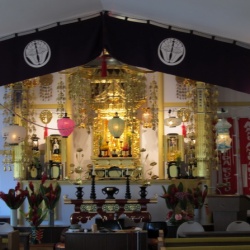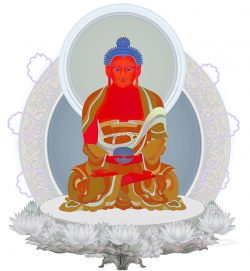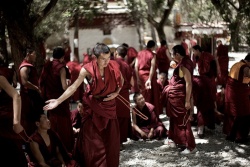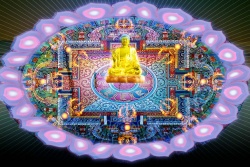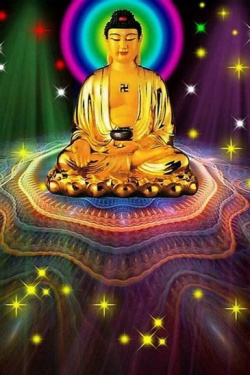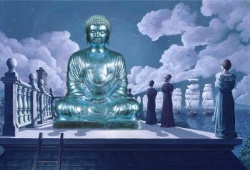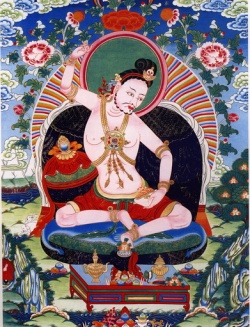1000 Armed Chenrezig and what he represents
Thousand-Armed Chenrezig, Avalokiteshvara, is a Sambhogakaya Buddha manifestation, a pure, subtle manifestation that is the union of prana and mind and not simply a fantasy form.
Chenrezig represents the pure power of enlightened energy.
Such form inherently exists in the pure nature of mind and can manifest to everyone, because pure Buddha nature is the nature of all sentient beings.
Chenrezig’s form body represents complete perfection.
And in order to do the meditation on Chenrezig properly, it is very important to be able to visualize his light-form and each detail as precisely as possible and understand what it represents.
Thousand-Armed Chenrezig has 11 faces and 1000 arms. His white, youthful form stands on a moon disc and multi-coloured lotus.
Chenrezig’s form is created from light and radiates light. His Eleven faces are each in its own colour: 4 faces are red, 3 white, 3 green and one black. Arranged like in a diagram:
Red
Black
Green—Red—White
White—Green—Red
Red—White—Green
The principal [[Chenrezig’s face in front is white.
If we imagine Chenrezig turning his head to the left by 90 degrees, we can find there his other – green – face. On the right from the white face, on our left hand if we are sitting across him is 1000-Armed Chenrezig’s red face.
Eleven faces symbolically represent the complete realization and accomplishment of the 10 stages on the Bodhisattva’s path to enlightenment.
The eleventh face is standing for the complete Buddhahood, complete perfection and complete manifestation of all the qualities combined together.
Complete purification from all obscurations and defilements combined with complete manifestation of all qualities represents a perfect Buddhahood and that’s what the 11 faces of Thousand-Armed Chenrezig represent.
A further representation of the details of the colours of these faces and the other aspects of Chenrezig’s body are the following. The three white faces represent form-bodies of all the Buddhas, and Chenrezig benefits all sentient beings through the essence of this form, and the blessings of this form, and the activities of this form.
Similarly, the three red faces represent a speech of all Buddhas, and Chenrezig benefits all sentient beings through the essence of this speech, and the blessings of this speech, and the activities of this speech.
The three green faces represent a mind of all the Buddhas, and Chenrezig benefits all sentient beings through the essence of this mind, and the blessings of this mind, and the activities of this mind.
The wrathful, black face on top represents how Chenrezig benefits sentient beings that are very difficult to subdue or to tame. Wrathfulness is a compassion turned into anger, because it is compassion in its most powerful state.
Therefore the meaning is that Chenrezig finds a way to benefit even the most difficult sentient beings. On top of the wrathful face is a red, Amitabha Buddha face.
In terms of the mandala principle, this symbolizes that Chenrezig belongs to the Amitabha Buddha Family, the Buddha of the western direction, or the Lotus Family.
One could understand the colours of the faces in terms of the four enlightened activities as well. White is for pacification, green is for enrichment, red is for magnetizing, and black is for subjugation.
White also represents purification, shamatha or calm-abiding meditation, and the overcoming of conflicting emotions.
Green also represents wisdom, that is, improvement or increase of qualities, especially knowledge and wisdom (in other texts sometimes represented as yellow). Red also represents attraction and empowerment.
Black also represents the wrathful mode of the deity; in this case it is the face of Mahakala, an emanation of Chenrezig. All except the wrathful face wear the usual Sambhogakaya ornaments.
Chenrezig has one thousand arms, of which 992 are in the gesture of supreme giving, and one thousand arms represent the one thousand chakravartins (universal monarchs).
They also represent Chenrezig’s wish to protect all beings in a thousand different ways. The thousand eyes in these hands represent the thousand Buddhas of this virtuous eon.
Finally, the one thousand eyes and arms represent the activity of all one thousand Buddhas combined together.
Chenrezig holds implements in the eight principal arms as follows :
First two hands, palms joined with the wish-fulfilling jewel
Second right arm holds crystal mala (rosary)
Second left arm holds golden lotus with stem
Third right arm holds mudra of supreme giving (no implement)
Third left arm holds empowerment vase
Fourth right arm holds wheel of knowledge
Fourth left arm holds bow and arrow
You may see a thangka in which the third pair of hands appears to be the fourth and vice versa, but the gesture of supreme giving is the third right hand, and the empowerment vase is in the third left hand.
The right hand holding the wheel and the left hand holding the bow and arrow may appear to be up in the air like a third pair, but they are actually the fourth pair.
Chenrezig wears thirteen different types of ornaments:
The eight jewelled adornments:
A jewel crown
Jewel earrings
A short necklace
Two long necklaces, one longer than the other
A bracelet on each wrist
A golden belt at the waist with loops of jewelry
Armlets on each arm
An anklet on each foot
The five silks:
1. A silk ribbon hanging from the back of the head
2. An upper garment
3. A long scarf
4. A silk skirt
5. A lower garment
Chenrezig radiates white or crystal clear light and appears translucent and insubstantial. In his heart centre is a white syllable HRIH on a moon disc.
The two palms joined right in the heart area are a symbol of direct perception into the dharmata, the true nature of phenomena. The wish-fulfilling jewel symbolizes Bodhichitta.
Just as a wish-fulfilling jewel fulfils everybody’s wishes, similarly Bodhichitta, which is the completely pure enlightened mind of Chenrezig, fulfils the wishes of everyone who prays for it.
In general, the golden lotus flower is a symbol of wisdom; it is completely pure and clear, even though it grows in muddy water.
Furthermore, there is the understanding that even though Chenrezig manifests in samsara, he remains completely pure and unstained by it.
The golden colour symbolizes the lotus’ rich quality, just as gold is universally considered precious and valuable.
The crystal rosary is intended to lead beings from samsara in the same way that one bead leads to another.
The gesture of supreme giving represents how Chenrezig gives ultimate siddhis to everyone, and in particular the nectar flowing from his fingers is directed toward the beings in the hungry ghost realm to which it provides relief from their suffering.
The hungry ghost realm is the primary focus of attention because, from the point of view of the mandala principle, Chenrezig is the manifestation of the Lotus Family, and the Lotus Family Buddhas have special power to benefit beings in the hungry ghost realm.
However, visualizing the nectar benefiting beings in all realms is also fine.
The empowerment vase with its nectar is a symbol of purification.
Just as water washes away dirt, similarly nectar from the empowerment vase purifies all negativities, karma, obscurations, and defilements.
The wheel of knowledge implies that Chenrezig is turning the wheel of dharma throughout the universe, beyond time and space. It also represents how he provides common, mundane siddhis.
The bow and arrow signify that Chenrezig is perfectly skilled at balancing and harmonizing skillful means and wisdom.
Chenrezig stands on the moon cushion with two feet to indicate that he abides in neither samsara nor nirvana. Chenrezig’s ornaments and robes symbolize the abundance of his enlightened qualities.
The lotus Chenrezig stands on represents renunciation, and the moon cushion above the lotus represents Bodhichitta.
The five coloured silks symbolize the five wisdoms with which Chenrezig is endowed.
A tenasera ( deerskin in Sanskrit) covers his left shoulder.
The symbolic understanding of this special deer is that it has natural-born compassion.
Its skin covers Chenrezig’s left shoulder over his heart area, which represents Thousand-Armed Chenrezig’s unceasing love and compassion for all sentient beings.
